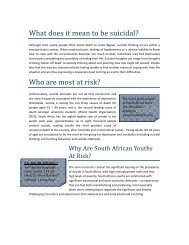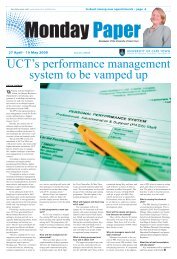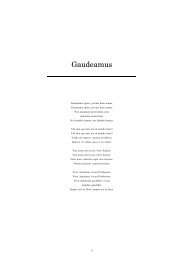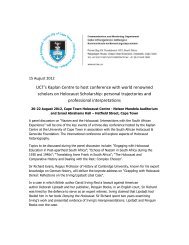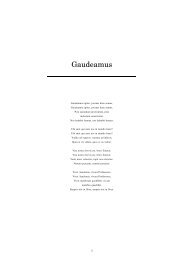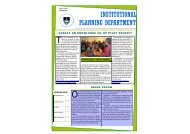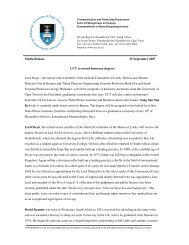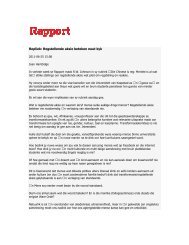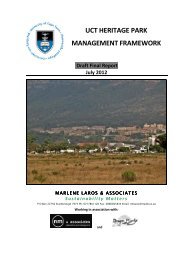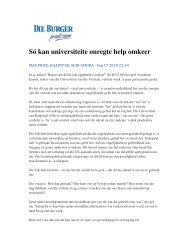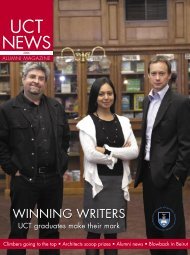Humanities 1:Layout 2 - University of Cape Town
Humanities 1:Layout 2 - University of Cape Town
Humanities 1:Layout 2 - University of Cape Town
You also want an ePaper? Increase the reach of your titles
YUMPU automatically turns print PDFs into web optimized ePapers that Google loves.
10<br />
In Psychological Research:<br />
*Katie Rachael Bromley<br />
Sarah May Cotton<br />
*(With distinction) Christa Gelderblom<br />
In Religious Studies:<br />
*Marie Bastienne Klein<br />
In Theatre and Performance:<br />
*(With distinction) Darron Araujo<br />
*Vaneshran Arumugam<br />
(With distinction) Alude Sinayo Mahali<br />
*(With distinction) Jacqueline Rita Singer<br />
DEGREE OF DOCTOR OF<br />
PHILOSOPHY<br />
In African Language & Literature:<br />
Michael Oyoo Weche<br />
Thesis Title: Bantu and Nilotic children’s<br />
singing games: a comparative study <strong>of</strong> their<br />
value communication<br />
Michael Oyoo Weche has a BA (Literature)<br />
and MA (Literature) from Kenyatta <strong>University</strong>,<br />
Kenya. He is currently a lecturer at the<br />
Catholic <strong>University</strong> <strong>of</strong> Eastern Africa,<br />
Nairobi, Kenya. He has been studying at<br />
UCT, in the department <strong>of</strong> African Languages<br />
and Literatures, since 2007.<br />
Michael Weche’s thesis examines<br />
the aesthetic form and value communication<br />
in selected Bantu and Nilotic children’s<br />
singing games, with particular reference to<br />
the Luhya and Luo communities <strong>of</strong> Kenya.<br />
Based on the premise that Luyha and Luo<br />
children’s singing games are creative outputs<br />
that reflect the macro cultures <strong>of</strong> the two<br />
communities, he uses ethnopoetic and ethnomethodological<br />
approaches to reveal the<br />
subtle communication in the singing games.<br />
The comparative analysis reveals<br />
that children’s creative outputs are repertoires<br />
<strong>of</strong> the aesthetics, aspirations and norms<br />
<strong>of</strong> their macro cultures. Through the performance<br />
<strong>of</strong> the singing games children socialize<br />
and assimilate the superstructure <strong>of</strong><br />
their communities’ aesthetics and norms.<br />
The performance <strong>of</strong> the singing games is also<br />
significant in the social and moral development<br />
<strong>of</strong> the child. The singing games therefore<br />
become significant in the child’s<br />
socialization and can also be used in an educational<br />
setting.<br />
Supervisor: Dr Abner Nyamende (School <strong>of</strong><br />
Languages and Literatures)<br />
In Afrikaans and Netherlandic Studies:<br />
Shathley Qadir Abrahams<br />
Thesis Title: Older than language: comics<br />
as heuristic for the philosophical canon<br />
SQ Abrahams has a BA and MA both from<br />
UCT, where he began his academic career in<br />
the mid-1990s. In 2001, he became the first<br />
African comics-scholar invited to present a<br />
paper at the Congress <strong>of</strong> the Americas,<br />
hosted that year in Puebla, Mexico. His pr<strong>of</strong>essional<br />
interests in popular culture allowed<br />
him establish links with both the field <strong>of</strong><br />
Religious Studies and study emerging from<br />
Information and Communications Technologies<br />
and their prospective roles in education.<br />
His thesis examines the role <strong>of</strong><br />
medium with respect to perennial questions<br />
recurring in the history <strong>of</strong> philosophy.<br />
Specifically, his thesis contends that the apperception<br />
<strong>of</strong> such questions, and their resulting<br />
resolutions, would be dramatically<br />
altered when articulated in sequential art,<br />
rather than in simple prose. To support this<br />
statement he explores a range <strong>of</strong> aesthetic<br />
mechanics <strong>of</strong> the comics medium, and various<br />
semioideological connotative structures<br />
that reflect on questions essential to the bodies<br />
<strong>of</strong> work <strong>of</strong> philosophers ranging historically<br />
from Giambattista Vico (c. 1725) to<br />
Michel Foucault (c. 1979).<br />
To underline an axiom central to<br />
his thesis, Older Than Language closes out<br />
with a brief exercise in speculative fiction.<br />
Imagining certain twists in history (the failure<br />
<strong>of</strong> Gutenberg’s printing press to popularize<br />
learning and overturn artistic patronage,<br />
for example), “Life In Print” is a posthumous<br />
tribute to writer who redefined the role <strong>of</strong><br />
popular culture and literacy.<br />
Supervisor: Pr<strong>of</strong>essor J Hambidge (School<br />
<strong>of</strong> Languages and Literature)<br />
In English Language and Literature:<br />
Fatima Fiona Moolla<br />
Thesis Title: Individualism in the novels <strong>of</strong><br />
Nuruddin Farah<br />
Fiona Moolla obtained her Undergraduate,<br />
Honours and Masters degrees from UCT.<br />
She previously served as a part-time lecturer<br />
in the English Department and is currently a<br />
lecturer in the Department <strong>of</strong> English at the<br />
<strong>University</strong> <strong>of</strong> the Western <strong>Cape</strong>.<br />
Fiona Moolla’s thesis performs a<br />
close reading <strong>of</strong> individualism in the novels<br />
<strong>of</strong> the Somali writer Nuruddin Farah. It argues<br />
that a specific, individualist conception<br />
<strong>of</strong> the self is central to the genre <strong>of</strong> the novel<br />
as a cultural form that emerged with modernity.<br />
This individualist conception locates the<br />
sources <strong>of</strong> the self within an internal moral<br />
horizon rather than in a realm external to the<br />
subject. Against this background, the thesis<br />
explores the constitution <strong>of</strong> the self in<br />
Farah’s novels, approaching them through<br />
the alternative insights <strong>of</strong> a moral philosophy<br />
which suggests that one’s idea <strong>of</strong> oneself is<br />
formed only in orientation to an external, social<br />
idea <strong>of</strong> virtue. [The Southern African<br />
ideal <strong>of</strong> ubuntu is one example <strong>of</strong> such an<br />
orientation]. The thesis therefore draws attention<br />
to the tension <strong>of</strong>ten generated between<br />
the social commitment Farah<br />
expresses as a writer and the constraints <strong>of</strong><br />
the form <strong>of</strong> the novel he employs. It is the<br />
first critical work on Farah’s novels that explores<br />
the ways in which the ideology <strong>of</strong><br />
form may work against the grain <strong>of</strong> an author’s<br />
social commitments.<br />
Supervisor: Pr<strong>of</strong>essor H Garuba (Centre for<br />
African Studies)<br />
Sarah Rowan<br />
Thesis Title: ‘The Efficacy <strong>of</strong> Song Itself’:<br />
Seamus Heaney’s “Defence <strong>of</strong> Poetry”<br />
Sarah Rowan has a BA (Honours) in English<br />
and Linguistics and an MA in Creative Writing<br />
(with distinction) from UCT.<br />
Her thesis focuses upon Seamus<br />
Heaney’s prose writing, particularly those essays<br />
<strong>of</strong> his in which he defines the function<br />
and purpose <strong>of</strong> poetry. Taken together,<br />
Rowan argues, these essays amount to the<br />
most concerted and far-reaching <strong>of</strong> the defences<br />
<strong>of</strong> poetry that are available to us in<br />
this historical moment. She underlines this<br />
point by placing Heaney in a long line <strong>of</strong> ‘defenders’<br />
<strong>of</strong> English poetry, beginning with<br />
Sidney and including Shelley and later poets<br />
like T.S. Eliot. She further highlights the special<br />
value <strong>of</strong> Heaney’s defence by contrasting<br />
his arguments with those <strong>of</strong> other famous<br />
contemporary poets, including Czeslaw<br />
Milosz and Joseph Brodsky.<br />
Although the thesis points out that<br />
Heaney’s arguments for the importance <strong>of</strong><br />
poetry are not unique in the originality <strong>of</strong><br />
their ideas—many <strong>of</strong> these derive from the<br />
work <strong>of</strong> his predecessors—the Irish poet’s<br />
powers <strong>of</strong> synthesis as well as his stylistic<br />
gifts make the presentation <strong>of</strong> these arguments<br />
more persuasive and less an instance<br />
<strong>of</strong> special pleading than any to be found in<br />
his contemporaries. His prose style, as well<br />
as the consistent grounding <strong>of</strong> his argument<br />
in examples provided by individual poems,<br />
constitutes a witness to the pleasure and the<br />
potency <strong>of</strong> the art form which is itself both<br />
uniquely pleasurable and potent.<br />
The originality <strong>of</strong> Sarah Rowan’s<br />
own thesis lies in the fact that, while<br />
Heaney’s distinction as a poet has attracted a<br />
huge critical literature, there has been no thesis<br />
to date which looks at his distinction as a<br />
prose writer. Nor is there any which recognises<br />
the extent to which his prose amounts<br />
to one <strong>of</strong> the most coherent statements available<br />
as to why poetry matters. ‘The Efficacy<br />
<strong>of</strong> Song Itself’ is a remarkable demonstration<br />
<strong>of</strong> just this.<br />
Supervisor: Pr<strong>of</strong>essor Stephen Watson<br />
(English Language and Literature)



